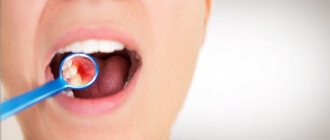Home>Articles> Remedies for fumes or how to get rid of bad breath in the morning
quick menu (hide)
- Theory
- Anti-fume remedy
- Effective remedies for fumes
- Medicines
Many have been in a situation where others found out about yesterday's alcohol consumption by the strong smell from their breath. And if friends just joke and laugh, then colleagues may treat this with great caution , and management will certainly react harshly, and sometimes inappropriately harshly. Therefore, in order to prevent troubles from occurring, it is necessary to get rid of fumes in advance and put your breathing in order ahead of time. In this article we will list all the effective ways to eliminate a pungent odor.
Theory
The smell of fumes appears and begins to disturb others within an hour and a half after raising the first toast. Fumes are exhaled products of the destruction of ethanol, processed by the liver into acetaldehyde.
Many people think that fumes are volatile alcohol vapors by the lungs This is not entirely true. At the same time, the odors of both substances can reach others, reinforcing each other. And the methods for eliminating “odors” also differ slightly.
The existing belief that the fumes reach others directly from the stomach of the person who drank is incorrect. The products of ethanol destruction, as well as acetaldehyde in huge quantities, are partially removed from the body:
- light,
- kidneys,
- skin.
But a large share is given to the lungs.
Fume vapor will hover around a person until the person is cleansed of all products of alcohol destruction and acetaldehydes. It all depends on how much alcohol a person has taken; the products of its destruction will smell from three hours to a day and a half. Therefore, it is impossible to completely neutralize the smell during these hours, but you can only mask the smell.
This smell is absolutely not dangerous. It can only cause a feeling of discomfort in others. But it is contraindicated for young children to be near and inhale the fumes of adults. The nervous system of babies and infants is not fully formed. A strong unpleasant odor can cause anxiety and disturb the child’s sleep and peace.
Types and degrees of hangover
As we noted above, narcologists distinguish between two types of hangover: the hangover of a healthy person who does not suffer from alcoholism, and the withdrawal syndrome characteristic of chronic alcoholics.
The degrees of hangover are divided into three levels of severity of alcohol poisoning.
Types of hangover
- A simple hangover is experienced by a person who does not suffer from alcoholism, and it occurs the next day after drinking heavily and lasts about a day. During this time, the person experiences unpleasant physical symptoms, and thoughts of alcohol cause disgust. Gradually, the physical condition returns to normal without any special consequences.
- Withdrawal syndrome is a consequence of chronic alcoholism. The desire to take a portion of alcohol is not a desire to have fun, it is a physical dependence, since ethanol is firmly integrated into the metabolic processes of the body. Abstinence is characteristic of stage 2 of alcoholism.
Hangover degrees
- Mild degree. With this degree of hangover, the amount of ethanol in the blood does not exceed 1 ppm (0.1%). The consequences are a slight increase in blood pressure, rapid heartbeat, and slight tremors in the hands. A mild hangover goes away on its own within a few hours and does not require special intervention.
- An average hangover occurs when the blood contains up to 2.5 ppm. Symptoms: nausea, vomiting, pale skin, arrhythmia, tachycardia. The consequences can be quite serious, including a stroke, so it is better to call a doctor and relieve the hangover with a drip. The procedure can be done at home, this service is anonymous, hospitalization is not required. In just an hour the person will feel better.
- Severe degree is a dangerous condition; there is more than 2.5 ppm in the blood. A person may lose consciousness, orientation, and cognitive functions. In case of complications, convulsions may occur or a coma may develop. Each of these symptoms is life-threatening and requires emergency medical attention and intensive care.
Getting rid of a hangover on your own using conventional drugs or folk remedies is only possible with the first degree of hangover. In other cases, you need a doctor or an ambulance.
A simple remedy for fumes
This problem has only one cause - the release of toxic substances into the surrounding air that arise from the destruction of ethyl alcohol and acetaldehyde vapors. Their removal can eliminate fumes and significantly improve a person’s condition.
But first you need to use any home remedy for fumes that masks the fumes.
- Gum. This is the most popular, cheapest and most common remedy for fumes in the morning, helping to “mask” the unpleasant strong odor well. But the effect of chewing gum is short-lived. The maximum you can count on is to deceive others for 10-15 minutes. Many people believe that mint chewing gum has But the strong smell of mint along with the strong “aroma” of fumes can give an unpredictable result. The best option is chewing gum with a strong fruity smell.
- Hygiene procedures. To make the smell of fumes less noticeable, you need to thoroughly brush your teeth with a strong-smelling toothpaste and rinse your teeth with a special product that also has a strong smell. Then it would be good to spray your mouth with an odor-repelling spray. This product, just like chewing gum, will act for 15-20 minutes, completely eliminating the odor. The fight against fumes needs to start with them.
- Flavoring. This is the most popular folk remedy for fumes. You just need to chew for two or three minutes the aromatic herbs that people use for salads and dressing meat. The composition of fragrant herbs includes: parsley, dill, basil.
It's good to use nutmeg, coffee beans or roasted pumpkin or sunflower seeds. They will help mask the bad odor for 30-40 minutes. But these products themselves have a fairly distinct aroma and not all of them are suitable for a working person.
Symptoms and signs of a hangover
The unpleasant symptoms experienced during a hangover are as follows:
- Throbbing “hammer” headache.
- Arrhythmia, tachycardia.
- Tremor of limbs and body.
- Heartburn, dry mouth, severe thirst.
- A sharp reaction to stimuli: loud sounds and bright lights cause a headache attack.
- Vascular network on the whites of the eyes.
- Depression associated with feelings of guilt for one’s behavior while drinking the previous day. Doctors call this “adrenaline melancholy.”
All these symptoms are the result of the negative effects of acetaldehyde. Acetaldehyde products have a specific psychotropic effect on the body. Possible convulsions and epileptic seizures after a severe hangover are a direct effect of acetaldehyde on muscle activity and convulsive readiness.
The symptoms of a hangover depend not on the type of alcohol, but on its quantity. Although there is an opinion that hangovers from vodka, cognac, whiskey and other strong drinks are less pronounced than from drinking low-alcohol drinks or sweet alcohol. Exceeding 1 g of pure ethanol per 1 kg of weight can already cause a hangover.
Another consequence of drinking alcohol is its diuretic effect. Frequent urination disrupts the composition of electrolytes in the blood, and this, in turn, causes inflammatory reactions in the gastrointestinal tract. This is how other hangover symptoms appear: nausea and vomiting.
Click here to view the conditions, tariffs and prices for treatment
Effective remedies for fumes
These are excellent, highly effective methods, but they will not work immediately. The result will become noticeable after six or eight hours.
- Drink plenty of fluids. This is the best remedy for fumes. Coffee, tea, fruit juice, mineral waters with or without carbonation will not only eliminate the unpleasant odor, but will also eliminate dehydration, which is a necessary consequence of drinking large volumes of alcohol. You can also use decoctions of medicinal herbs - lemon balm, chamomile, mint, St. John's wort. Freshly squeezed juice will not only normalize fluid levels in the body, but will also saturate it with vitamins and ascorbic acid. This method works flawlessly if there are no kidney or heart diseases and blood pressure does not increase. Otherwise, the additional fluid will create a load on these organs, which can trigger an attack and cause the person to be hospitalized.
- Balanced diet. A bowl of borscht, chicken broth or a regular omelet helps saturate the body with nutrients and proteins and complex amino acids that are not synthesized by the body. These substances can help the liver quickly cope with the neutralization of acetaldehyde and help quickly remove alcohol breakdown products from the blood. For dessert you can eat currants, watermelons or strawberries. But watermelons can be eaten by those for whom excess fluid in the body will not cause problems with blood pressure or kidney failure.
- Exercises. In order to quickly get rid of the “aroma” of alcohol, you need to take a long, quiet walk. Or open the windows wide and ventilate the room well. If you feel normal, then you can do light exercises.
- To activate your lungs and speed up the process of clearing your breath, you can do simple breathing exercises - take calm, deep breaths and leisurely exhalations for several minutes. Hyperventilation will not only clear your breath, but will also help saturate your blood with oxygen, which will make headaches less severe and significantly ease your heart condition. As a result of such gymnastics, it will be possible to clear your breath for a few minutes, which will allow you to visit your boss’s office without arousing suspicion. But you shouldn't stay there for long.
- Water procedures. This is an excellent remedy for fumes. A cold bath or shower can cleanse the pores and remove toxic elements and other toxins from them. The Russian bathhouse or Finnish sauna is considered a particularly powerful remedy for this. But only those people who do not have heart disease or hypertension can use this remedy immediately after taking large doses of alcohol.
How long does a hangover last?
Basically, the duration of a hangover depends on the amount of drinking - usually from 24 to 48 hours.
However, the state of a hangover is largely influenced by the rate at which alcohol is eliminated from the blood, and many factors play a role here: age, gender, weight, health status, genetic predisposition:
- men eliminate alcohol faster than women;
- overweight people get rid of alcohol and its breakdown products faster than thin people;
- a young body is able to break down ethanol faster than an old one;
- In the body of people suffering from chronic diseases, alcohol is retained for a longer period.
one of them is 10 kg heavier, then, all other things being equal, the thin guy will suffer from a hangover longer.
Medicines
The most publicized of them is “Anti-policeman”. There are a number of other remedies similar to it in the type of action. But these drugs, like chewing gum, can only eliminate the fumes for a few minutes. Then he will appear again. You can’t rely on “miracle cures,” take them and get behind the wheel.
The following medications will help you quickly overcome the smell:
- Limontar,
- Zorex,
- R-ICS 1.
- Some of us think that activated carbon will help get rid of the unpleasant “aroma”, because it absorbs harmful substances. This is, of course, true, but it takes some time for the coal to start working. In addition, charcoal will not cope with harmful substances that have already entered the bloodstream or are excreted through the pores of the skin or lungs. Therefore, absorbents are good and effective, but they will begin to act after some time.
- A good remedy is succinic acid. It speeds up metabolism, which allows for faster removal of ethanol and acetic acid from the body. Succinic acid is taken one tablet every hour. The total number of tablets cannot be more than 6.
- Glutargin has an excellent hepatoprotective effect. Glutargin has antihypoxic and antioxidant properties. It is included in some anti-odor products. It is used to eliminate acute alcohol poisoning and helps solve the odor problem well.
- Eleutherococcus tincture. This is a means to improve immunity. But it stimulates the heart well, which speeds up the passage of blood through the liver and its cleansing. This helps accelerate the breakdown of harmful substances and remove them from the body. Eleutherococcus is taken in the morning, immediately after waking up.
- An excellent remedy for eliminating fumes is taking a decoction of medicinal herbs. The collection includes: thyme, rose hips, St. John's wort, ginseng root. It is good to add a little citric acid to the broth.
- Spruce and pine needles have an excellent remedy for eliminating unpleasant odors. It is good to rinse your mouth with a decoction of pine needles. It's okay if it gets into your stomach. But drinking a decoction of pine needles is still not recommended because of its strong taste, which causes nausea and the presence of turpentine in the decoction, which cannot be taken orally.
- There are several folk remedies that help get rid of odor. These are mainly herbal collections and decoctions. They may include rose hips, chamomile, currant or strawberry leaves, bay leaves, and dried fruits. These remedies are very good for hangovers . They have a restorative and restorative effect and accelerate the removal of harmful substances from the blood. They do not begin to help with the smell immediately, but after some period of time after all metabolic processes have normalized.
To get rid of an unpleasant odor as soon as possible, it is better to try several remedies at once that relate to:
- eating,
- drinking,
- physical activity,
- compliance with hygiene standards.
If your relative or loved one is on an alcoholic binge, leave a request to call a narcologist to your home to help you get out of your binge, the specialist will provide the necessary drug treatment assistance.
What is a hangover?
To begin with, we note that the hangover of a person who drinks alcohol from time to time and the hangover of a chronic alcoholic are completely different conditions. If you do not differentiate between them, you cannot talk about adequate relief from a hangover.
- A healthy person suffers from a hangover (veisalgia is its medical designation) due to poisoning by ethanol breakdown products. One of the most dangerous of them is acetaldehyde, which is formed in liver cells; it is because of it that a person feels so bad in the morning. Poor health is affected, among other things, by ethanol itself and fusel oils contained in alcohol. As a result, incontinent drinking of alcohol results in headache, nausea, dizziness, and dehydration (“dry drink” in popular parlance). After some time, the body will restore natural metabolic processes and the person will feel better.
- For a chronic alcoholic, a hangover is a withdrawal syndrome or abstinence. The well-being of an alcoholic worsens immediately after stopping drinking alcohol, which for a long time took an active part in metabolic processes and became physiologically necessary for the body. Simply put, alcohol replaced the main energy fuel - glucose - for a long time. In this case, stopping drinking alcohol can cause delirium tremens, psychosis, and alcoholic schizophrenia. The withdrawal symptoms of a chronic alcoholic can only be relieved by a doctor using a detoxification drip.
Experienced narcologists advise that you definitely contact a professional if the hangover is severe and does not go away for a long time. Call us: we work around the clock and on condition of anonymity.
Why does my breath smell after drinking alcohol?
When ethanol enters the body in impressive quantities, a person develops a hangover syndrome. This condition has a lot of symptoms - headache, nausea, vomiting, fumes. Most symptoms are successfully relieved by special pills, but in the situation of fumes the matter becomes somewhat more complicated.
In general, the sequence of occurrence of an unwanted odor is described as follows.
- Ethanol enters the body through alcohol (wine, cognac, beer - it doesn’t matter).
- Next, ethyl alcohol is almost instantly absorbed into the blood, which distributes it throughout the organs and tissues - all without exception.
- The body begins to cleanse itself, removing toxins that formed after the breakdown of alcohol.
- The liver produces enzymes that help break down ethanol into metabolites.
- Due to the remaining elements from ethyl alcohol, the drinker reeks of fumes. Alcohol metabolites move through the bloodstream, accumulate in the lungs and form that very smell.
note
If a person does not calculate his dose and drinks too much, then a disgusting smell will emanate from his entire body. The body eliminates alcohol metabolites through urine and sweat. After 10-15 minutes, a person who has had too much to drink begins to emit repulsive odor.
Why is a hangover dangerous?
We hope that no one will argue with the fact that alcohol is a poison that acts on the body accordingly. The liver takes the main blow, then the kidneys, cardiovascular system, and central nervous system suffer. Chronic diseases are worsening, and prerequisites for the formation of new pathologies appear. In short, there are no organs and systems that are not affected by alcohol.
Many have heard about the dangers of withdrawal syndrome that accompanies chronic alcoholism. However, you should know that the so-called hangover of a healthy person (one-time feast with heavy alcohol consumption) can lead to a fatal outcome.
Here's the danger:
- As a result of dehydration, the blood thickens, and intoxication triggers the process of blood clots. A predisposition to thrombosis may worsen the situation.
- Exacerbation of chronic diseases of the heart, blood vessels, and gastrointestinal tract.
- Exacerbation of urolithiasis, pancreatic diseases.
- The likelihood of gastric bleeding, the risk of perforation of an ulcer.
- Development of liver failure.
According to statistics, death from a simple hangover is quite rare, but there is a risk, especially for people suffering from chronic diseases.
Quitting alcohol completely is a great way to protect yourself from possible risks. It happens that even a small portion of alcohol causes irreversible reactions. If there is no addiction, then giving up alcohol will be completely painless, which cannot be said about chronic alcoholics with persistent withdrawal syndrome, when only a doctor can help.
We definitely advise you to consult a doctor even if there is no addiction, but your morning health is poor even for a simple hangover. A doctor will come to your home and perform a detoxification procedure. It's safe, fast, efficient and anonymous.
If time is short
The body will independently eliminate the half-life products of alcoholic beverages within 6-8 hours, but what if you have an important meeting or need to hide a stormy feast? It is worth using folk remedies. They will not give a long-term effect, but for a while they will make the consequences of the buffet table less noticeable.
- Coffee beans. Excellent help to cope with unpleasant breathing. Chewing a couple of grains can hide the fumes for half an hour. To maintain the impression of a teetotaler all day, you need to stock up on a 150-200 gram bag of coffee beans.
Is there a difference in hangover depending on the type of alcohol?
Doctors believe that a hangover is caused not by the type of alcohol, but by the amount of alcohol consumed. This means that any alcohol itself can cause a severe hangover if you drink more of it than the body can process without much harm to health. Moreover, ethanol also contains other substances and compounds: acetaldehyde, fusel oils, tannins, acetone, esters, etc.
Additional components included in a certain type of alcohol can have a negative effect on the body. For example, dark beer causes a worse hangover than light beer. Clear strong alcohol (vodka) is less toxic than dark alcohol (bourbon, cognac). The consequences of drinking sweet alcohol are more severe than those of dry white wine. Of course, we are talking only about high-quality branded drinks (low-quality clear vodka can cause fatal poisoning).
There is one more nuance that experienced consumers of alcoholic beverages talk about: you cannot mix different types of alcohol.
Doctors believe that the best way to avoid a hangover is to not drink at all. Or, if it doesn’t work out any other way, strictly control the amount you drink.
How to avoid a hangover
Let's not engage in moralizing and say that the best way to avoid a hangover is not to drink at all. The time when it was necessary to educate is long gone.
Therefore, here are some tips to help mitigate the consequences of a large party:
- Eat before the feast. During the feast, eat more fruits and vegetables rich in fiber. Fiber is the same sorbent.
- Try not to exceed the dose you drink. If this cannot be avoided, be smart: drink juice or mineral water.
- Drink clear alcoholic drinks without gases: it has been found that if you follow the measure, the hangover from them will be weaker.
- If you begin to feel sick during a feast, do not resist, this is how the body fights the poisoning.
- During the feast, drink more water: this will help the alcohol leave the body faster.
- Please note: taking some medications is incompatible with drinking alcohol. Read the instructions carefully so that instead of a hangover you do not get anaphylactic shock or Quincke's edema.
If, despite the measures taken, poisoning could not be avoided, be sure to call us, we will help! There is no need to be shy here; we, doctors, understand that anything can happen in life. Remember that health is more important than conventions!










